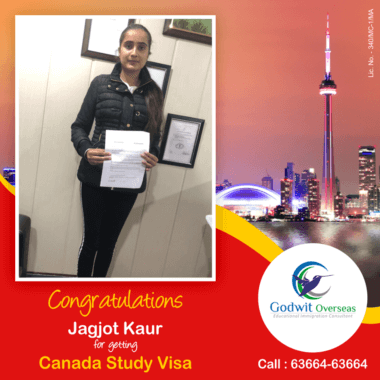Immigration FAQs
What is the procedure to study abroad ?
The application process for studying abroad is time-consuming and requires applicants to start preparing well in advance of their anticipated start date. It is very important to begin the admission process early because in many cases application deadlines are far in advance of the start of the semester (sometimes as many as ten months). You also need to allow time for scheduling any standardized tests needed for admission and then having the results of these tests sent to schools. There is no uniform worldwide application system. Each college or university establishes its own unique policies.
The 6 basic steps for applying abroad are:
- Identifying country, universities and the course of your interest
- Request universities for Application forms
- Taking various required tests
- Arranging and preparing Essays and recommendation letters
- Completing and Sending Application forms along with required documents
- Reporting various test scores to the universities
Which are the best countries for studying abroad as per the expenditure, climate, and cost of living?
It is every parents dream to ensure that their children get the possible education – some even start planning and saving for it since the day their kids are born. However, higher education is an expensive affair, especially if you want to send your child to a foreign university. Other than the tuition fees, you will also need to factor in the cost of living. These can vary from country to country and city to city as well. It is important that you factor in both heads of expenses while chalking out your budget.
United States of America
Tuition Fees : Varies drastically across public and private colleges. Rs 25–30 lakh in a private college, Rs 15–23 lakh in a public college
Cost of living : Average cost of living is Rs 75,000 a month. Living on the east coast is cheaper than on the west coast.
Total annual cost : Rs 34 lakh
Australia
Tuition Fees : Rs 10-16 lakh for an undergraduate course , Rs 12–18 lakh for a postgraduate course
Cost of living : Prescribed cost as per visa requirement is Rs 86,000 a month. Varies across cities. For example, difference in living cost between Sydney and Canberra is around Rs 17,000 per month.
Total annual cost : Rs 25 lakh
United Kingdom
Tuition Fees : Fees ranges from Rs 8 lakh to Rs 18 lakh.
Cost of Living : Prescribed cost as per visa requirement is Rs 1.1 lakh a month for London and Rs 91,000 a month outside London.
Total annual cost : Rs 25 lakh
Can a visitor visa be converted to a work permit ?
It is suggested for the applicant to always follow the law and maintain a clear profile. As per the visitor visa conditions, a visitor is forbidden from seeking any paid employment offer in Canada.
If found guilty, the candidate may never be able to settle in Canada for the rest of his/her lifetime. Each candidate must also leave Canada on the due date of their visitor visa expiry.
Delay or failure to do so shall force the immigration department to report them to the Police and their profile may also be reported to other countries. This will hinder the candidate’s future travel plans to Canada and even other parts of the World.
How did you get a scholarship to study abroad?
The trick is knowing not only where to look for study abroad scholarships, but also how to apply for them. Even though they may not fully cover your study abroad costs, they’ll help decrease your expenses and make your study abroad experience more affordable. Read on for tips on how to apply for study abroad grants and scholarships, as well as a helpful list of scholarships and grants you should apply for ASAP if you want to study abroad.
How to Score Financial Aid for Study Abroad
We’ve compiled as many study abroad scholarships and grants as we could find right here, but it’s not an exhaustive one. In addition to looking here, here are some tips for finding more study abroad scholarships and grants:
- Apply for federal financial aid — many students don’t realize that these government grants and loans may be used towards study abroad. You can fill out the application
- Once you pick a study abroad program, Google to find financial aid options available through that specific program.
- Check with the government of the country you want to study abroad in — some give financial support to international students.
- Visit your financial aid office, study abroad office, and foreign language departments to ask about potential funding sources.
- Ask your study abroad advisor if there are any scholarships specific to your major.
- Check local organizations like Sons of Italy chapters, German clubs, Hispanic heritage groups, Chinese-American associations, etc. to see if they offer scholarships.
- Get busy applying for any scholarships, grants, or funding options you find!
After 12th grade in India, should you send your child to study abroad ?
Study Options after 12th Grade in the UK:
Oxford, Cambridge and Birmingham are important cities in the UK and each city has a renowned university in it. You will need to complete an International Foundation Year Programme before you can join a full-fledged undergraduate degree of your choice. The Foundation Year Programme focuses on subject-specific learning with additional modules in English and Communication.
Studying after 12th Grade in the USA:
The USA follows a four-year undergraduate study structure in most universities. On completing your 12th Grade, you can join a programme directly if you meet the prescribed entry requirements. Usually an IELTS score ranging from 5.5 to 6.0 is the basic English proficiency score required for admission.
How to Study after 12th Grade in Australia:
Australia offers a unique proposition, Technical and Further Education (TAFE) Institutions offer a variety of vocational and industrial training programmes that range from six months to two years. In fact every year, a number of students from cities like Punjab, Mumbai, Chandigarh and the National Capital Region go to Australia to enrol in a TAFE institution. On completing these programmes they may choose to join a relevant University programme directly in the second year of study. In addition to these TAFE programmes, regular entry to an undergraduate degree at an Australian university is based on the applicant’s English language skills and score in the 12th Grade.
Higher Study Options after 12th Grade in New Zealand:
New Zealand has eight government-funded universities, a number of private-degree-offering institutions and many polytechnic institutes. If you meet the prescribed entry requirements, you can join an undergraduate degree programme or a technical course. The minimum English proficiency score ranges from 5.5 to 6.0 on the IELTS.
Studying in Canada after 12th grade
Canada offers a host of benefits and choices for international students. Cities like Toronto, Ottawa and Vancouver are popular student cities and they have reasons to be. There are several options for a student to study in Canada after 12th grade; they can choose to study courses like engineering, life sciences and arts and humanities.
The multi-cultural atmosphere and post-study work opportunities are primary reasons why so many Indian students move on to Canada for a degree. In addition, the country’s growing economy is another reason for the easy migration of students because it means a large number of industries can invest in different businesses that again support the growing student employment.
Study Options after 12th Grade in Singapore:
The past five years have seen Singapore emerge as the most popular study abroad destination for students from India. Singapore offers an array of undergraduate degree programmes at half the cost of a degree in the USA or the UK. Additionally, the culture and the weather are similar to that of India and travel costs are less expensive. Additionally, a few Singaporean universities offer academic scholarships to meritorious applicants.
How many funds are required to study abroad?
Do you want to get a good education from a university abroad? Are you sceptical that the money that you plan to spend for your education may not be sufficient? You would have had these thoughts countless times, and every time you wanted to plan a budget, you withdrew yourself from proceeding further because you thought a degree abroad would cost you a fortune. Is that right?
What if we give you a plan – a minimum budget required to study in a country overseas? The list includes countries like the UK, USA, Canada, Australia, Singapore, Malaysia and Germany. Don’t just read the information we provide, please make use of it.
To manage your study abroad budget, you can look for certain types of scholarships too –
- Merit-based scholarships – these scholarships are awarded to students based on their academic records, which also include students’ athletic and artistic talents and any other extra-curricular activity records that they may have.
- Need-based scholarships – need-based scholarships are open to highly meritorious students who want to study overseas, but don’t have means to sponsor their education cost. Some US institutes offer ‘need-blind’ admissions that promise fully funded education for students with poor socio-economic backgrounds.
- Specific scholarships – there are several destination-specific, programme-specific and subject-specific scholarships open for international students in countries abroad.
Shortcuts to manage your money and overcome financial challenges while studying abroad
- Figure out what are the other expenses, besides your tuition and living expenses, which you have been considering till now. If you find some unnecessary expenses, just cut them off your life.
- Know the locals living in the region you stay. Understand the way people live their lives in the region. A deep knowledge about the locals and communities will help you communicate in their language and find survival tips when you face any difficulties. This will also help you understand what to buy, and what not to, and therefore making you efficient in managing your budget.
- Find the cheapest way you can commute from one point to another. Facilities like student pass and international student ID card go a long way in helping you manage your transport expenses.
- Sort out your money exchange options. It’s better to open a bank account in the country you are moving to so that you can save a lot of time and unnecessary international fees.
How a native from India should get settled abroad as a PR?
Foreign countries like Canada and Australia are filled with great aspects. The aspects like higher income, free education, healthcare facilities, a liberal government, and growing work opportunities attract the young individuals of today.
According to many recent reports, many immigrants migrate to Canada and Australia majorly because of the International Permanent Residency Status. The PR can easily be achieved if individuals can work towards that goal with a proper immigration consultancy.
Godwit Overseas is a reliable name that has helped thousands of young individuals to migrate to Canada and Australia in quick span of time. We’ve also helped many families to settle abroad and give their children a better life.If you too want to experience an awesome life in Canada, then here’s everything you need to know about the Canada PR.
What is a Permanent Resident visa?
A permanent resident visa is a document that is granted to skilled workers to allow them to live, work, and settle in the country.
They can stay in the country that with this permanent residency permit for as long as they want to. There are many immigrants with a wide range of skills that are called over to the country with this opportunity.
The aging population, growing jobs, lack of talented and skilled individuals, low birth rates and the rising economy might be a few reasons why countries prefer to invite skilled immigrants on a permanent resident visa.
Which country is best for migration?
There are various countries that one can apply and go to. However, for decades Canada has been stated as the most immigrant-friendly country. Canada is also the fastest in approving permanent resident visa applications.
Not only does Canada also have a wide range of careers but it also has a number of policies that are made for the public.
How many years does it take to be a citizen of Canada after getting the PR?
Eligibility Criteria
In order to apply for Canadian citizenship you must:
- Provide proof that you know how to speak and write in 1 of Canada’s official languages (either English or French)
- Be a Permanent Resident (PR)
- Have lived in Canada as a PR for at least 1,095 days out of the 5 yearsbefore you apply.
- Have filed your taxes for at least 3 years during the last 5 years and any income tax you may owe must be paid.
Application Process
- fill out the forms
- Include all supporting documents.
- Pay the application fee.
- Mail your application
Do I have to write the test?
If your application is accepted you have to write a citizenship test. Children under 18 years of age and persons 54 and over do not have to write the citizenship test.
Why am I being asked for fingerprints?
You may be asked to provide fingerprints and/or court documents when you apply for citizenship. This is to make sure that you are not prohibited under the Citizenship Act.



